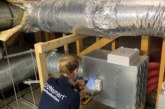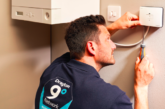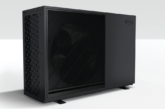
With government support for renewables at a low ebb, Martyn Bridges, Director of Marketing and technical support at Worcester, Bosch Group, tackles the topic of heating efficiency within new build homes, and discusses the different options available.
It may not seem that long ago that developers around the country were being advised to build homes featuring low carbon heating technologies, with heat pumps once dubbed the future of domestic heating. Over the last 12 months or so however, the government’s decision to close a number of environmental policies and ‘green’ incentives indicate that the pipedream of renewables-based heating may not have been as practical as first thought.
The fact is, our existing housing stock – not to mention its occupants – is unprepared for replacing their high temperature boilers with low temperature heat pumps. Not only that, but with builders and developers being tasked with the delivery of more affordable homes, the new build sector is arguably not in a position where it can justify taking on the extra expense which can often be incurred by heat pump installations.
So what next when it comes to ensuring the long-term performance and efficiency of heating appliances? With the gas infrastructure in the UK so stable, and over 85% of properties connected to it, the heating industry has now turned its focus to improving boiler efficiency in order to offer added value for money. By adding additional accessories and undertaking regular servicing and maintenance checks, developers can help maximise the longevity of traditional heating and hot water systems whilst offering cost saving solutions for homeowners.
The special treatment
 Developers will be familiar with the need to flush a new heating system, but from that point onwards, it is vital that the boiler, its components, and pipework is kept in prime condition. Once a system flush has been carried out, adding a system filter will complement the process; assuring the long-term protection of an appliance by collecting any contaminants that may not have been removed at the time.
Developers will be familiar with the need to flush a new heating system, but from that point onwards, it is vital that the boiler, its components, and pipework is kept in prime condition. Once a system flush has been carried out, adding a system filter will complement the process; assuring the long-term protection of an appliance by collecting any contaminants that may not have been removed at the time.
With a wide range of system filters now available, the opportunity is there to proactively reduce the risk of system contamination. A twin action system filter is capable of capturing both magnetic and non-magnetic system water contaminants, helping to protect the boiler and wider central heating system components. Ultimately, what is a relatively low-cost accessory when partnered with a new boiler, is likely to prompt efficiency improvements, energy cost savings and an extended boiler lifespan.
Flue gas recovery
Flue gas heat recovery units have been around in relatively small numbers for six or seven years and the market for this technology tends to be led by housebuilders eager to maximise efficiency gains. The technology is a simply way of improving energy efficiency with the energy contained within the flue gases being removed and added to the incoming water mains before it enters the combi boiler to be heated into domestic hot water.
Since these units contain no moving parts, they relatively straight forward to both install and maintain. These heat recovery systems make it possible for typical domestic properties to achieve savings of between 300-400 kWh of gas per year, while reducing CO² emissions by around six per cent. So, while the initial outlay for one of these units can be perceived as large – at least relative to the cost of the boiler – it is comparatively lower than some other carbon saving products such as solar thermal panels.
The art of smart
Plenty has been said of smart technology over recent months, but coupling a gas boiler with some form of intelligent heating control can pay real dividends in terms of long term savings.
For controls to be truly smart, the ultimate aim should be to make it much simpler for the end user to maximise the performance of their heating system rather than merely being able to connect to the web. Built-in elements such as load and weather compensation adapt the flow and return temperatures of the boiler, ensuring it condenses as much as possible and actually lessens energy consumption.
If budgets don’t stretch to the latest in smart technology, a number of relatively straightforward plug-in controls still offer weather and load compensation to prescribe the exact output and temperature the boiler should fire at. This makes it much more practical to introduce a simple measure with the potential to reduce unnecessary energy usage.
Thanks to the latest developments in heating technology, condensing boilers appear set to remain the most effective way of heating the majority of properties in the UK. Renewables may be yet to grasp the interest of homeowners, but efficient and affordable heating is still needed to meet the country’s energy demands and this is where developers can really play their part by optimising the performance of the heating systems they install at every given opportunity.








